Capital Insurrection
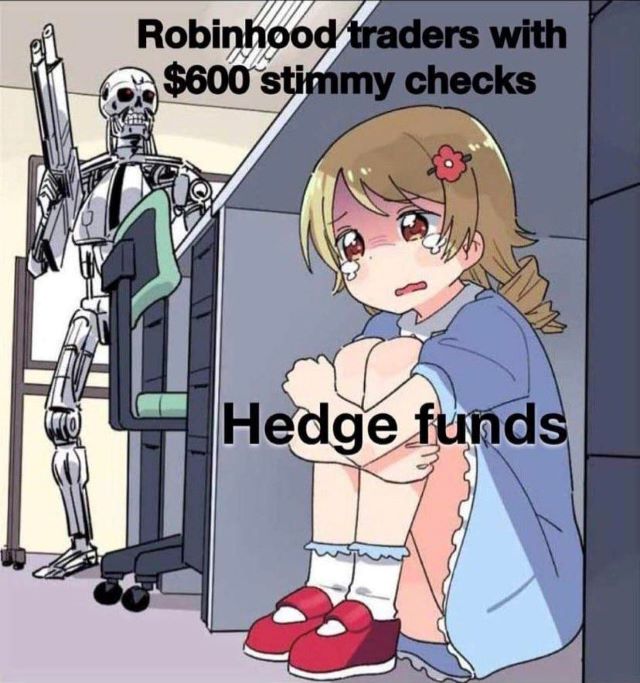
Meme via r/WallStreetBets
The Meme Stock Uprising
We've got a trade idea where you can join in the meme stock uprising without losing your shirt. More on that below, but first let's look at the big picture of what's happening now. It's fascinating in its own right, but the way the conventional wisdom sets with respect to the meme stock uprising may lead to real consequences. Before you discount that, consider that a veteran of the meme war of 2016 was just indicted by the Department of Justice.
Douglas Mackey (aka Ricky Vaughn on Twitter) has been arrested and indicted by the Eastern District of New York for tweeting/retweeting a handful of memes in 2016. https://t.co/WTJ8YWQw0X pic.twitter.com/4Y2L7q2Kd1
— Chris Menahan 🇺🇸 (@infolibnews) January 27, 2021
Power hates mockery.
Viewed From The Right
In our last post (GameStopped), we mentioned that the r/WallStreetBets squeezes on GameStop (GME) and other meme stocks such as AMC (AMC) were a revolt against the establishment:
In a post earlier this month (The Establishment Strikes Back), we wrote about how the capital wing of establishment cracked down on Trump and his supporters. One motivation behind WallStreetBets' short squeeze/gamma squeeze is of course to make money. But another apparently is to strike back at the establishment. One cynical tweeter tied the two points neatly together:
The mass elation caused by GamestopGate should seriously concern the elites. Basically everyone under 40 is now oriented toward enjoying any victory over the elites more than any circus the elites can put in front of them.
— HankHeIl (@HankHeil) January 26, 2021The Cohen he refers to there is Stephen A. Cohen, whose Point72 Asset Management, along with Citadel, had to pour additional billions into Melvin Capital as Melvin got GameStopped.
As of Wednesday night, some pundits on the center right were making similar points,
Can we call the GameStop thing what it really is?
— Melissa Chen (@MsMelChen) January 28, 2021
A Capital Insurrection
GameStop is the first populist uprising without Trump we’ve had since 2015. It will go on without him.
— Ryan James Girdusky (@RyanGirdusky) January 28, 2021
Viewed From The Left
But some on the left had other ideas. Monopoly scholar Matt Stoller suspected that Wall Street market makers were behind the short squeezes, and using Reddit as a cover.
Good. I've changed my mind on what's happening. This isn't some populist revolt against market-rigging hedge funds, it's a puppet show where shorts are being eviscerated by giant cynical market-makers using Reddit populism as cover. https://t.co/8pmAezbwSG
— Matt Stoller (@matthewstoller) January 27, 2021
This, despite market maker Citadel pouring billions into Melvin Capital, which got torched by the GameStop short squeeze.
Meanwhile, former hedge fund manager and current bitcoin enthusiast Mike Novogratz compared WallStreetBets to BLM protestors. Novogratz also suggested what they were really crying for was "DeFi" (decentralized finance, i.e., crypto).
1)This GME squeeze is deeper than a squeeze. its a large group of people saying they don't want Citadel preying on their orders from RH, they don't want IPO's being allocated to insiders, they don't like a system geared to the already rich.This is a giant endorsement of DEFI.
— Mike Novogratz (@novogratz) January 27, 2021
One difference between BLM and r/WallStreetBets comes to mind immediately. The BLM riots destroyed small businesses in cities across America, while WallStreetBets so far has saved at least one business, AMC. Thanks to Redditors bidding up its stock price, the movie theater chain was able to complete a secondary offering, raising hundreds of millions of much-needed dollars. Novogratz should know something about the damage caused by BLM - his fund bailed out many of the rioters.
With respect to Novogratz's thoughts about decentralized finance, if you read popular posts on WallStreetBets like this one ("An Open Letter To Melvin Capital, CNBC, Boomers, and WSB"), you don't see anything about "DeFi". You see still-lingering rage about what happened in 2008.
Corporate Sponsorship Or Crackdown
Novogratz's mention of BLM is instructive though, as it suggests one possible resolution of the meme stock revolt: corporate sponsorship.
Maybe big Wall Street firms will donate money to an AstroTurfed nonprofit that claims to advocate for small investors.
Another possible resolution is a crackdown. WSB got a taste of that on Wednesday when Discord shut down its server.
Time will tell. Let's look at how you might make some money in the meantime.
Looking At Current Meme Stocks
In our previous post, we mentioned that GameStop never made our system's top names (every trading day, we post a top ten based on our analysis of returns and options market sentiment). Of the YOLO stocks posted here on WallStreetBets, Nokia, (NOK), BlackBerry (BB), Bed Bath & Beyond (BBBY), GameStop, AMC, and Express, Inc. (EXPR), only BBBY made our top ten names recently. That was on December 31st of last year.
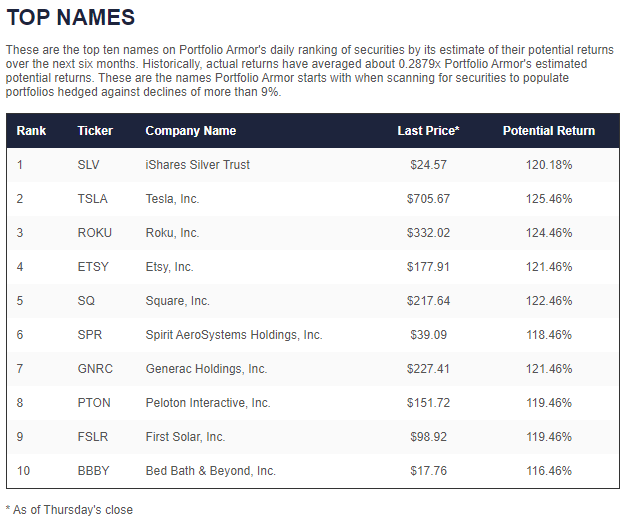
Our top ten names on 12/31, via Portfolio Armor.
As of Wednesday's close, BBBY was up 197.8% since 12/31.
But our system is no longer bullish on BBBY at current levels. The only YOLO stock it's currently bullish on is BlackBerry. This has nothing directly to do with WSB's gamma squeeze prediction, and everything to do with our analysis of options market sentiment on it. In a nutshell, the OTM calls on BlackBerry our system looks at are getting bid up more than the OTM puts it looks at. That makes the trade below possible for BlackBerry, but not for the other names we listed above.
A Hedged Bet On BlackBerry
Here's a way to bet on BlackBerry without losing your shirt if it heads south. This was the optimal collar, as of Wednesday's close, to hedge 100 shares of BB against a >30% drop over the next month while capping your upside on the stock at 59% (the highest cap at which this worked).
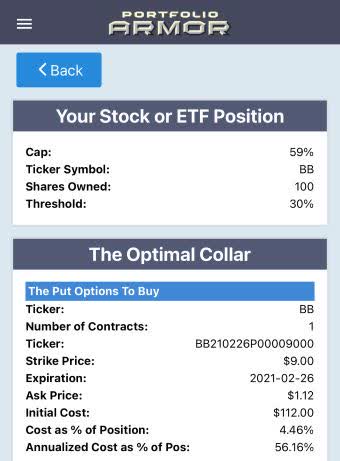
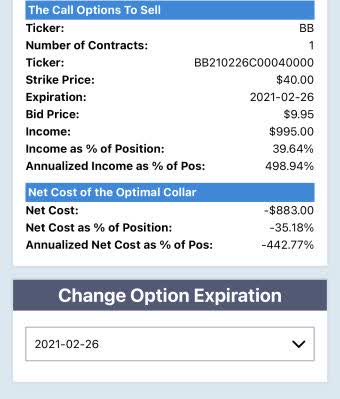
Screen capture via the Portfolio Armor iPhone app.
Note the negative hedging cost there. When opening that collar, you would have collected a net credit of $883, or 35.18% of position value, assuming, to be conservative, that you placed both trades at the worst ends of their respective spreads (buying the puts at the ask and selling the calls at the bid - in practice, you can often buy and sell options at some price within the spread).
Heads You Win, Tails You Don't Lose Too Much
Since you bank a net credit equal to ~35% of your position with that hedge, your maximum upside over the next month is your 59% cap on the stock plus that: 35% + 59% = 94%. Your worst case scenario is a loss of 30%. Heads you win, tails you don't lose too much. BlackBerry's down a bit in the pre-market as I type this, so be sure to scan for an updated optimal collar for it before placing any trades.

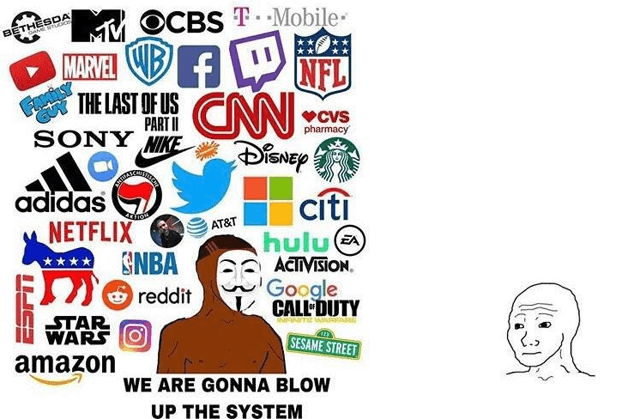
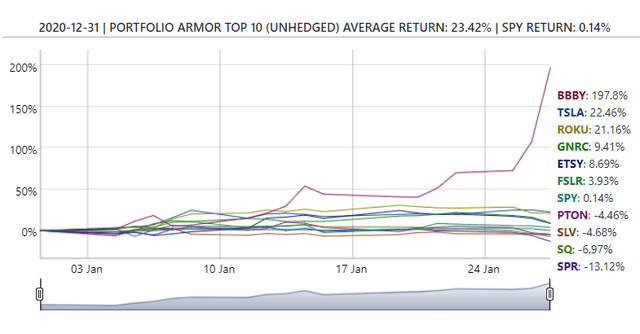



I had not considered that the whole mess could look so very different from the two sides. I am not, and have never been, anywhere near that "1%" group, but certainly in the top half of the US group. Being rich is having more than what you need, being poor is having less than what you need. Of course, there are wide spans in both of those segments. There is my evaluation of how things are. (not certain about exactly how that relates.) So thanks again, Mister "P".
Thanks for an interesting and educational explanation.
My pleasure. Thanks for the comment.